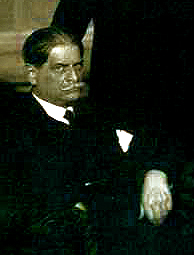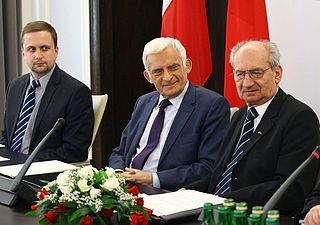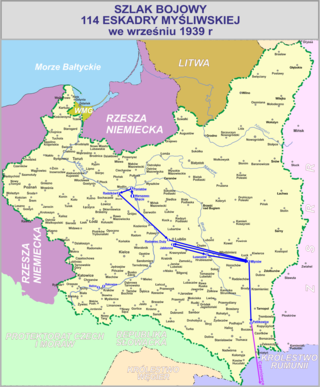Jerzy Dabrowski may refer to:
- Jerzy Dąbrowski (1899–1967), Polish aeronautical engineer
- Jerzy Dąbrowski (lieutenant colonel) (1889–1940), Polish resistance member
- Jerzy Dabrowski (volleyball), Polish Paralympic volleyball player and athlete
Jerzy Dabrowski may refer to:

The Crown of the Kingdom of Poland was a political and legal idea formed in the Poland in the 14th century, assuming unity, indivisibility and continuity of the state. According to this concept, the state ceased to be the patrimonial property of the monarch or dynasty, but became a common good of the political community of the kingdom. Such an idea allowed the state to function even in periods of interregnum and led to the formation of a system characteristic of Poland based on the parliamentarism of the nobility and the free election of the ruler. At the same time, the idea of the crown went beyond existing political boundaries; lands lost in the past were considered to belong to it.

Jarosław Żądło-Dąbrowski, also known as Jaroslav Dombrowski, was a Polish nobleman and military officer in the Imperial Russian Army, a left-wing independence activist and radical republican for Poland, and general and military commander of the Paris Commune in its later period. He was a participant in the Polish 1863 January Uprising and one of the leaders of the "Red" faction among the insurrectionists as a member of the Central National Committee and the Polish Provisional National Government.

Jan Henryk Dąbrowski was a Polish general and statesman, widely respected after his death for his patriotic attitude, and described as a national hero who spent his whole life restoring the legacy of Poland.
Dąbrowski or Dabrowski is the 11th most common surname in Poland ; this is down from an apparent rank of 4th in 1990. Dąbrowski is a habitational name derived from the placename 'Dąbrowa' or 'Dąbrówka', which is used for several specific places in Poland or generically as "oak grove", the English meaning for these Polish words. Variants of the surname include Dombrowski, Dobrowski, and Dobrosky. Dobrowski also has an independent origin as a habitational name derived from the placename 'Dobrów'. The text-figure below summarizes the relationships among these various words. In other Slavic countries, the same surname takes the form Dubrovsky, as the Polish "ą" corresponds to "u" in most other Slavic languages.

Greater Poland uprising of 1806 was a Polish military insurrection which occurred in the region of Wielkopolska, also known as Greater Poland, against the occupying Prussian forces after the Partitions of the Polish–Lithuanian Commonwealth (1772–1795).
Jerzy Dąbrowski was a Polish aeronautical engineer. He was the lead designer of the famed PZL.37 Łoś medium bomber.

Silesian Parliament or Silesian Sejm was the governing body of the Silesian Voivodeship (1920–1939), an autonomous voivodeship of the Second Polish Republic between 1920 and 1945. It was elected in democratic elections and had certain influence over the usage of taxes collected in Silesia. It consisted of 48 deputies.
Kowalewski is a Polish surname. It may refer to:
This fighter is sometimes called "PZL.62", but the correct designation is PZL.55.

Stefan Tytus Zygmunt Dąbrowski (1877–1947) of Radwan coat of arms – Physician, physiologist, biochemist, and Polish politician. Rector: Adam Mickiewicz University - Poznań, Poland (1945–1946).
Nowicki is a Polish and Jewish surname. It comes from place names such as Nowice, which are derived from the Polish adjective nowy ("new"). The surname is somewhat more frequent in central Poland. It has many forms in other languages.

Jerzy Władysław Zdrada is a Polish historian and politician.

The 114th Fighter Escadrille of the Polish Air Force was one of the fighter units of the Polish Army at the beginning of the WW2.
The Orchestra Conductor is a 1980 Polish drama film directed by Andrzej Wajda. It was entered into the 30th Berlin International Film Festival, where Andrzej Seweryn won the Silver Bear for Best Actor. It was also shown at the 1980 New York Film Festival.
Szwarc is a Polonized-Yiddish version of the German surname Schwartz.

Jerzy Dąbrowski, Dąmbrowski, Dombrowski Junosza coat of arms, nom de guerre"Łupaszka" – cavalry officer with the rank of podpułkownik in the Polish Army of the Second Polish Republic, guerilla fighter.
Bartłomiej is a Polish masculine given name, a cognate of Bartholomew. Diminutive forms of Bartłomiej include Bartek and Bartosz. Notable people with the name Bartłomiej include:

The mansion/manor home (dwór) in Michałowice village, Lesser Poland province, Poland, designed by prominent architect Teodor Talowski, and reminiscent of a suburban villa, was constructed in the years 1892–1897, for the noble (szlachta) family, Żądło-Dąbrowski z Dąbrówki herbu Radwan, who moved from Mazovia, Poland.
Jerzy Dabrowski competed for Poland in the men's standing volleyball event at the 1988 Summer Paralympics, where he won a bronze medal.